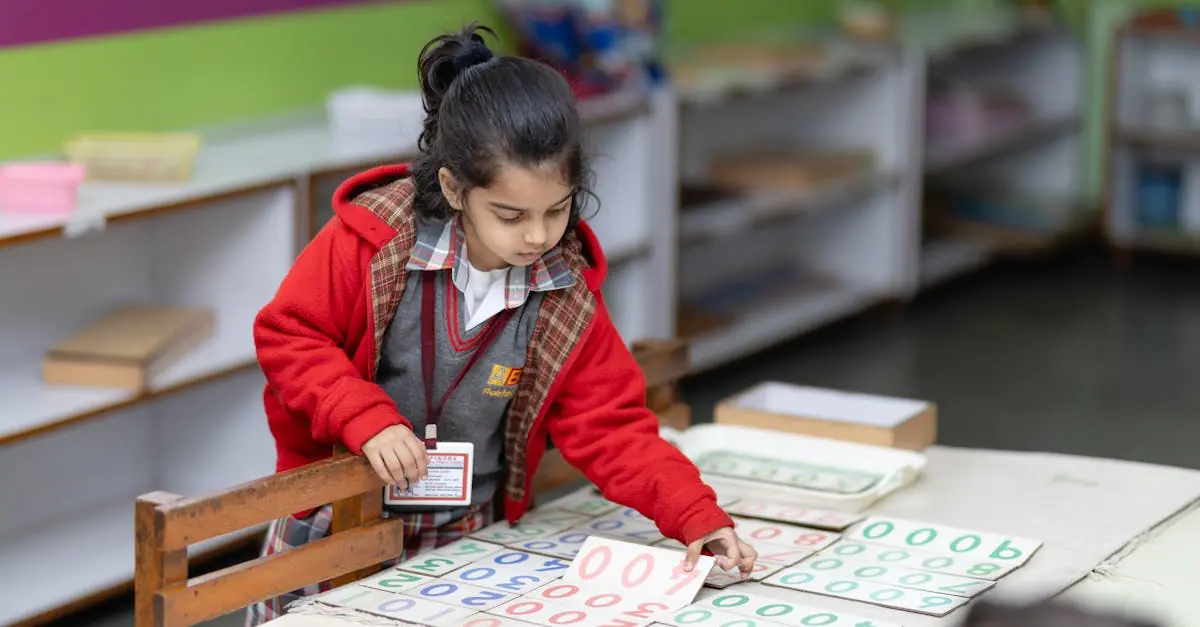Math doesn’t have to be a four-letter word in preschool! In fact, it can be a whole lot of fun. Imagine tiny hands stacking blocks, counting colorful beads, or even playing with shapes that dance around like they’re at a party. Engaging preschoolers in math activities not only sparks their curiosity but also lays the groundwork for critical thinking and problem-solving skills.
With a sprinkle of creativity and a dash of laughter, these activities turn learning into an exciting adventure. Whether it’s counting cookies or measuring ingredients for a mini-chef showdown, math can be as delightful as a scoop of ice cream on a hot day. So let’s dive into some imaginative math activities that will have kids giggling while they learn—because who says math can’t be a blast?
Table of Contents
ToggleImportance Of Math Activities For Kids Preschoolers
Math activities play a crucial role in preschoolers’ early learning experiences. Engaging with math concepts through play fosters a positive attitude towards learning.
Enhancing Cognitive Development
Participating in math activities promotes cognitive growth in preschoolers. Engaging with numbers, patterns, and shapes encourages critical thinking. Solving puzzles and counting objects enhances logical reasoning skills. These early experiences lay a foundation for future academic pursuits. Stimulating curiosity through play allows them to explore mathematical concepts naturally. Research indicates that hands-on activities improve retention and understanding, making learning more effective.
Building Fundamental Skills
Math activities help preschoolers build essential skills for their future education. Counting games lay the groundwork for arithmetic proficiency. Sorting and categorizing objects develop organizational abilities and logical categorization. Exposure to measurement concepts cultivates spatial awareness and vocabulary. Through interaction with manipulatives, children strengthen fine motor skills. Each activity nurtures problem-solving capabilities, setting the stage for advanced mathematical concepts later. These foundational skills prove vital as they progress into more complex math challenges.
Fun Math Activities
Engaging math activities can transform learning into an exciting adventure. Preschoolers thrive in hands-on environments where they explore concepts through play.
Hands-On Counting Games
Counting games foster numerical skills and enhance fine motor abilities. Using everyday objects, kids can practice counting by sorting buttons or stacking blocks. Engaging them in games like “Number Treasure Hunt” encourages exploration while they search for hidden numbers around the house or yard. Creatively utilizing materials like pasta or pasta shapes allows children to further experiment with quantities and basic addition. These activities not only promote learning but also turn math into a fun, interactive experience.
Interactive Story Problems
Interactive story problems capture children’s imaginations while teaching math concepts. Utilizing everyday scenarios, such as sharing snacks or playing with toys, can make problems relatable. For instance, asking how many apples are left if three are eaten fosters problem-solving skills. Incorporating images alongside narratives aids visual learners in grasping the concepts better. Crafting stories that require counting or simple addition enhances engagement, turning lessons into playful adventures. This strategy creates excitement around math as children actively participate in learning through storytelling.
Incorporating Technology
Incorporating technology into math activities can enhance preschoolers’ learning experiences. Engaging with digital tools fosters excitement and curiosity about mathematical concepts.
Educational Apps For Preschoolers
Educational apps designed for preschoolers offer interactive experiences. Many apps feature fun games that teach counting, addition, and basic geometry. Using colorful graphics and intuitive interfaces, these apps capture children’s attention effectively. Examples include “Endless Numbers” and “Todo Math,” which promote engagement through playful learning. Consistent gameplay can improve number recognition and numerical fluency, making math enjoyable.
Online Resources And Tools
Online resources and tools provide a wealth of educational content. Websites such as PBS Kids and National Geographic Kids offer math games tailored for young learners. These platforms often include printable worksheets that reinforce fundamental skills. Utilizing interactive activities can enhance problem-solving abilities, as many resources adapt to children’s learning paces. Additionally, online videos can introduce math concepts in an entertaining manner, ensuring preschoolers remain engaged and motivated to learn.
Tips For Parents And Educators
Creating a supportive atmosphere enhances preschoolers’ math learning experiences. Set up a dedicated space at home or in the classroom filled with math-related materials like counting games, measuring tools, and shapes. Surround children with colorful charts that display numbers and math concepts. Provide attractive math books that capture their interest. Regularly reinforce the fun aspect of math through playful experiences.
Encouraging exploration nurtures curiosity among young learners. Allow children to engage hands-on with everyday items for counting, sorting, and measuring. Promote questions about shapes and quantities encountered during daily routines, such as snack time or while shopping. Encourage them to discover patterns and relationships, such as comparing sizes of toys. Offering praise for their inquisitive nature fosters a love for learning and enhances their confidence in math skills.
Embracing math activities for preschoolers can transform their early learning experiences into joyful adventures. By integrating play and creativity into math concepts, children develop essential skills while having fun. These engaging activities not only foster a positive attitude towards learning but also build a strong foundation for future academic success.
Parents and educators play a crucial role in creating an inviting environment that nurtures curiosity and exploration. With the right resources and encouragement, preschoolers can approach math with enthusiasm and confidence. The journey of learning math doesn’t have to be daunting; it can be a delightful exploration that sets the stage for a lifetime of learning.



